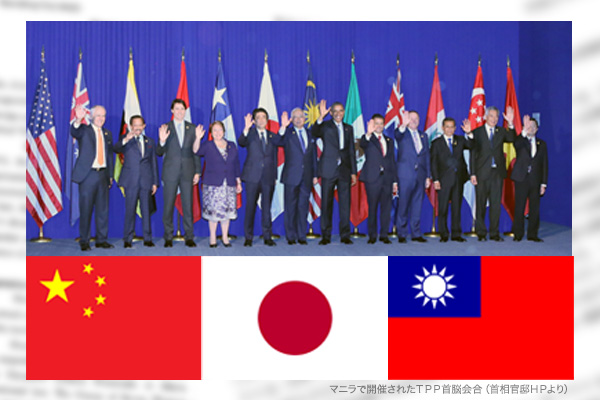Can the 11 member countries of the Comprehensive and Progressive Agreement for Trans-Pacific Partnership (CPTPP) reject the membership application of China that is rapidly closing in on the United States as a huge economic power? Shortly after the new AUKUS security partnership was launched by the United States, the United Kingdom and Australia to deter China, Beijing officially applied to join the CPTPP as if to challenge the U.S. move. Taiwan followed suit immediately. The CPTPP free trade agreement was suddenly politicized.
The CPTPP has originated from the TPP understood tacitly as an economic coalition led by Japan and the U.S. against China. But Beijing is now poised to take advantage of the U.S.’ withdrawal from the TPP to increase its influence in the Pacific region. Japan must use its wisdom to block China’s accession to the CPTPP to prevent China from attaining regional supremacy. At the same time, Taiwan that shares democratic values with the 11 CPTPP members should be allowed to accede to the free trade agreement.
Chinese attempt
A flurry of applications to join the CPTPP should be welcomed in nature as a development to expand the free economic bloc. Although the United Kingdom applied to join the pact in February, it should not be treated in the same way as China that is attempting to control the CPTPP, high-level trade and investment liberalization achieved by the 11 CPTPP members is opposite to Chinese state control being enhanced under the Xi Jinping regime.
Regarding the CPTPP, Beijing apparently gives priority to (1) blocking Taiwan’s accession to the agreement, (2) driving a wedge between the CPTPP members to destroy coalition against China and (3) exploiting the CPTPP to establish its regional hegemony. Especially, China will make utmost efforts to avoid the CPTPP accession by Taiwan that accepts CPTPP rules and meet conditions for the accession. In 1991, China and Taiwan simultaneously joined the Asia Pacific Economic Cooperation (APEC) forum, indicating a setback from the One-China Principle. This may have been a nightmare Beijing may not want to repeat.
Beijing cannot be expected to abide by the existing CPTPP rules, to begin with. Since joining the World Trade Organization (WTO) in 2001, China has benefited from favorable trading conditions while refusing to correct its unfair trading practices. It is very obvious that Beijing will build on its successful WTO experience and demand exceptions from free trade rules in a manner to insist trading rules are decided by big powers.
U.K. accession procedure should be a precedent
Could the 11 CPTPP members resist Chinese pressure? We know new CPTPP membership must be approved unanimously by the existing members. Given that China is the largest trading partner for many of them, however, China could achieve the division of the CPTPP by winning over a majority of the existing members. Among the members of the Association of Southeast Asian Nations (ASEAN), Singapore and Malaysia have already welcomed China’s CPTPP membership application. Furthermore, Singapore is set to assume the CPTPP chair next year, increasing the probability for China to start negotiations on its accession to the pact.
Therefore, Japan should impose strict conditions on the U.K.’s CPTPP accession first, while calling on the U.S. to come back to the free trade pact. The U.K. has already entered negotiations on its accession. The CPTPP members should share conditions for the U.K.’s accession as the precedent for approving other countries’ accession, formulating a rule of rejecting any application by a country refusing to meet the precedent conditions. As a matter of course, Taiwan would be allowed to enter CPTPP accession negotiations if it meets the conditions. Japan should cooperate with Australia, Canada and other CPTPP members to deal with CPTPP accession applications in a businesslike manner following such procedures.
Hiroshi Yuasa is a Planning Committee member and a senior fellow at the Japan Institute for National Fundamentals. He is a columnist for the Sankei Shimbun newspaper.


